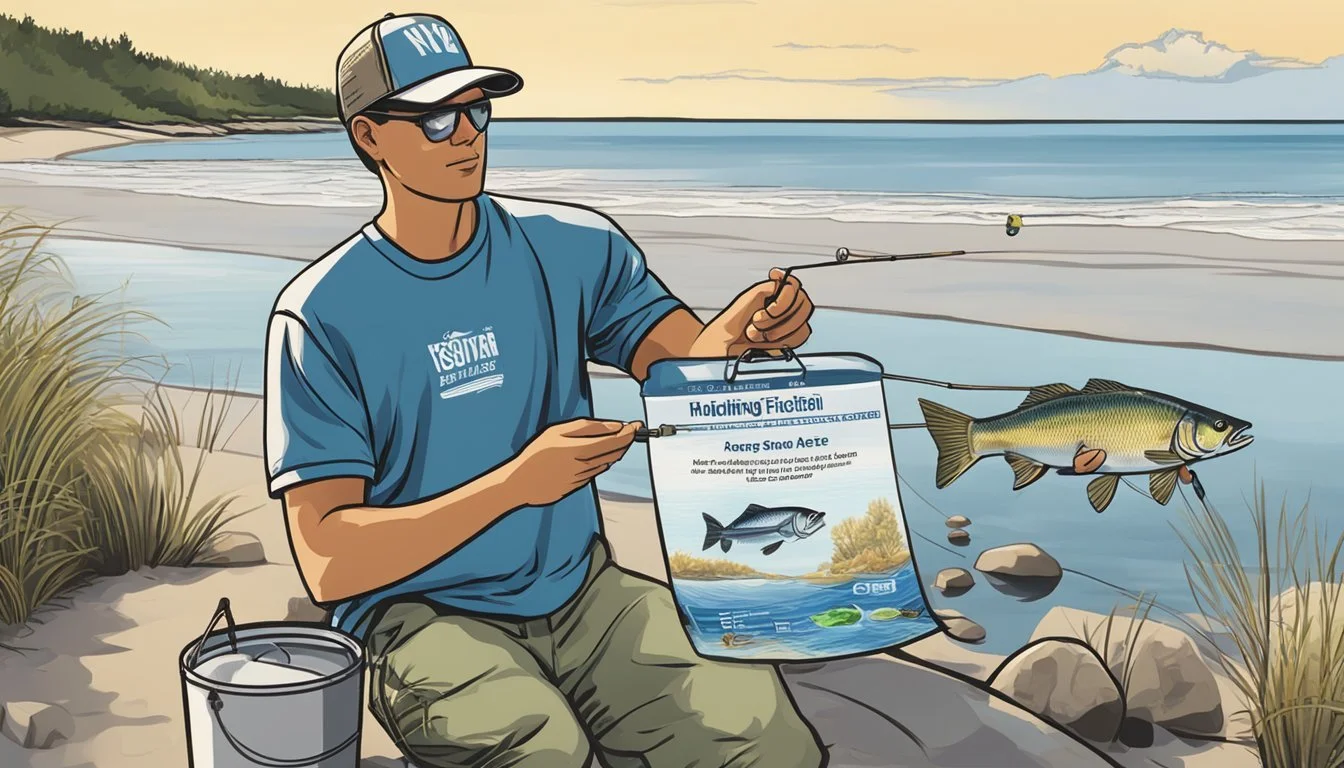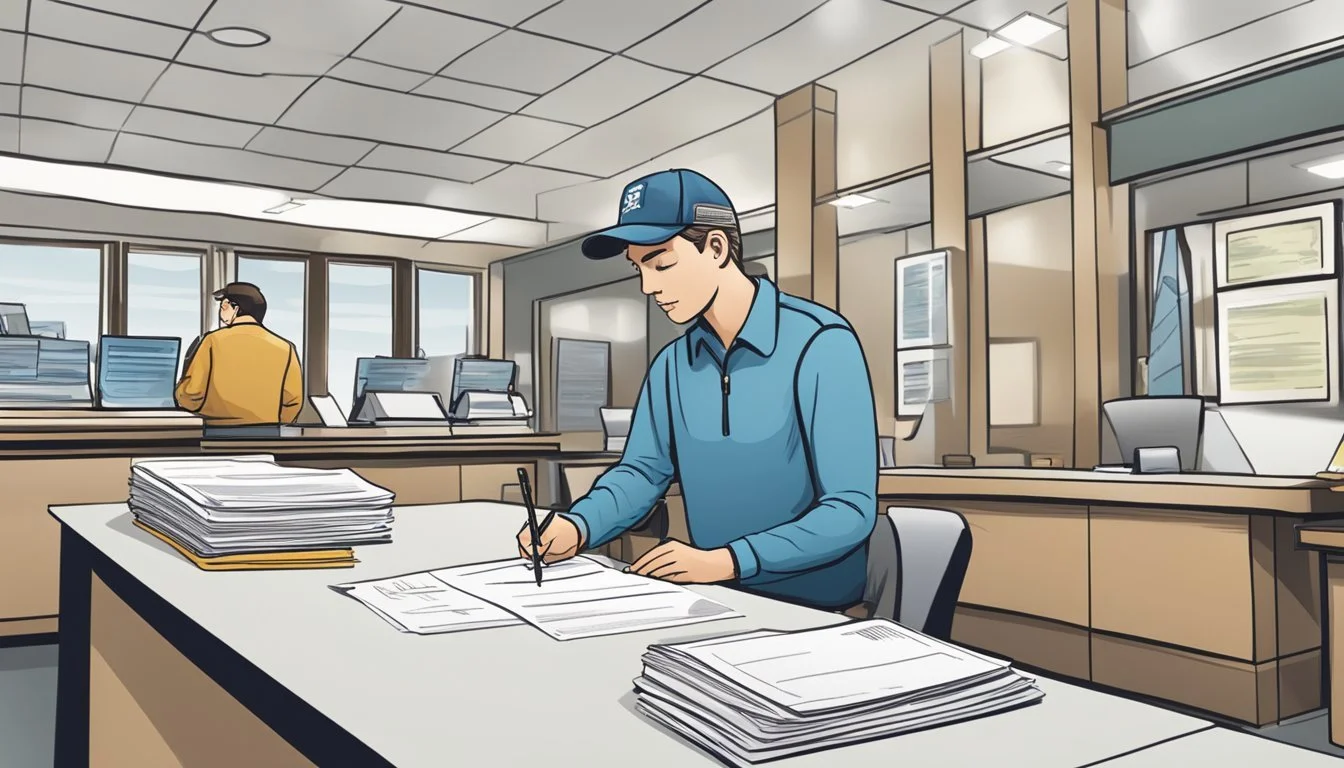How to Get a New York Saltwater Fishing License
A Step-by-Step Guide
Saltwater fishing in New York provides anglers with diverse and vibrant marine life to explore, and obtaining a saltwater fishing license is a legal requirement for fishermen aged 16 and older. This licensing ensures both the sustainable use of fishery resources and the regulation of marine activities. The process of getting a saltwater fishing license in New York is designed to be straightforward and accessible for residents and non-residents alike, catering to a wide audience of fishing enthusiasts.
The New York State Department of Environmental Conservation (DEC) offers a Marine Fishing Registry at no cost, which is mandatory for recreational marine fishing. The registry is valid for one year from the date of enrollment and must be renewed annually. To accommodate applicants, there are several modes of obtaining this registration— online, by phone, or in person through a licensed issuing agent.
In addition to the registry, New York offers various fishing licenses that cater to the different needs of anglers. Fishing licenses come with distinct types and fees, and they necessitate residency qualifications for certain categories. For more specialized fishing activities, like commercial fishing, specific permits and licenses are required, which have their own application processes and prerequisites.
Understanding Fishing Licenses in New York
Before venturing into the diverse waters of New York for fishing, it's essential to understand the various licenses available, the difference between saltwater and freshwater licenses, and the specific licenses for different groups.
Types of Licenses
New York issues fishing licenses that are mandatory for individuals aged 16 years and older who engage in the fishing of freshwater species. These licenses come in different durations:
Annual licenses offer a year's worth of fishing from the date of purchase.
7-Day licenses are for those looking for a shorter duration.
1-Day licenses cater to the occasional fisher or tourist.
Lifetime License: For avid fishers, a lifetime fishing license is also an option.
Saltwater vs Freshwater Licensing
In New York, a Freshwater Fishing License is a separate entity from the Recreational Marine Fishing Registry, which is required for saltwater fishing. The Recreational Marine Fishing Registry is necessary for fishing in the coastal waters of New York or when fishing for migratory marine fish (What wine goes well with fish?):
The Registry is free of charge.
It's mandatory for anglers not required to have a freshwater license.
The Registry helps in the conservation and management of marine resources.
Special Licenses for Different Groups
Certain groups are eligible for special licensing options in New York:
Senior Citizens: Residents 70 years and older may obtain licenses at a reduced cost.
Military Veteran License: Discounted licenses are available for military veterans with a 40% or greater disability rating.
Active Duty Military: New York residents who are on active duty with the armed forces are entitled to free fishing licenses.
Eligibility and Requirements
New York offers a variety of fishing license options tailored to both residents and non-residents, accommodating individuals with disabilities, as well as recognizing the privileges of senior citizens and veterans. Below is a breakdown of the eligibility and requirements for obtaining a saltwater fishing license in the state.
Age Requirements
In New York, anyone 16 years and older must register with the Recreational Marine Fishing Registry before saltwater fishing. For younger anglers, registration is not required.
Resident Qualifications
To qualify for a resident fishing license, one must live in New York State for at least 30 days immediately prior to application. Residency is verified through a state driver's license or other acceptable proof.
Disability Provisions
Individuals who are legally blind or have other qualifying disabilities are eligible for certain concessions. New York recognizes Disability Benefit Identification Cards as sufficient proof of a qualifying disability. Native Americans who reside on reservation land and patients of U.S. Veterans Administration Hospitals can also receive licenses under specific conditions.
How to Purchase a License
Obtaining a New York saltwater fishing license involves a straightforward process. Interested anglers can easily purchase a license either online, in person at specific locations, or through a phone registration system.
Online Purchase Process
To purchase a license online, one must visit the official website using a computer. Firstly, those with an existing account should select the login option at the top right corner of the page. New users should opt for the "Sign-up" option to create an account. After logging in, the individual can navigate to the “Buy licenses” section to complete the purchase.
In-Person Purchase Locations
Licenses are also available at various in-person purchase locations, including official New York State Department of Environmental Conservation (NYDEC) offices and authorized sporting and retail stores. One can locate the nearest venue through the NYDEC's website or by contacting the department directly.
Phone Registration
For those who prefer to register by phone, the process involves calling the NYDEC's customer service number. A service representative will guide the caller through the process, which typically requires providing personal details and payment information over the phone.
License Receipt and Confirmation
Regardless of the method chosen for the purchase, customers will receive a receipt and an order confirmation page. They should carefully review this documentation to ensure all information is accurate and keep it for their records as proof of purchase. The official license, along with usage regulations, will be provided following the transaction's completion.
Fishing License Costs
When purchasing a New York saltwater fishing license, there are a variety of costs associated depending on the type of license one opts for. From standard fees to lifetime options, anglers should consider the most appropriate license for their fishing needs.
Standard License Fees
For individuals looking to fish in New York's marine waters, various standard licenses are available with fees that vary based on the applicant's age, residency status, and the duration of the license. Non-residents typically pay higher fees compared to New York residents. It's important for anglers to provide proof of residency to qualify for resident rates.
Annual licenses for residents can range from about $5 to $25.
Annual licenses for non-residents might range from about $10 to $50.
Short-term licenses are also available, such as a 1-day or 7-day license, which can cost from $5 to $15, respectively.
Lifetime Licenses Cost
For dedicated anglers, lifetime licenses are a cost-effective option in the long run. Prices for lifetime licenses may seem substantial upfront but eliminate the need for yearly renewals.
Lifetime saltwater fishing licenses for an adult resident can cost around $150.
Children and seniors often qualify for reduced fees.
Purchasing a lifetime license also contributes to New York's Conservation Fund, which is dedicated to the conservation and improvement of New York's fish and wildlife.
Additional Permits and Stamps
In addition to basic licensing, anglers may require additional permits or stamps depending on their activity.
For instance, fishing in certain freshwater locations may necessitate a Habitat Stamp, costing an additional small fee, usually under $5, which supports habitat conservation efforts.
Further, specialized activities like fishing for certain species might require an additional permit, so it's crucial to check the latest regulations and requirements.
Fishing Regulations and Guidelines
In the state of New York, saltwater anglers are expected to adhere to specific regulations that govern species, seasons, and fishing methodologies. These guidelines are designed to sustain diverse marine life while offering recreational opportunities.
Species-Specific Regulations
For saltwater fish species, anglers must follow established size and possession limits to help manage fish stocks effectively. For example, fluke (summer flounder) have minimum size limits and season dates that change annually. In contrast, regulations surrounding shark and tuna also include strict reporting requirements due to their status as highly migratory species.
Open Seasons and Protected Areas
Open fishing seasons vary per species to ensure sustainable populations. Protected areas are designated to maintain ecosystems and some areas are off-limits to fishing year-round. New York provides a specific schedule for when each saltwater species may be legally fished. For instance, periods where migratory fish can be caught in certain water bodies will have clearly delineated open seasons.
Fishing Methods and Gear Restrictions
New York State mandates certain gear restrictions to protect marine habitats and ensure ethical angling practices. Here's a breakdown of some gear-specific regulations:
Spearing and longbow fishing are permitted for certain species, with spearing not allowed in freshwater for anadromous species.
The use of tip-ups is regulated, with numerical limits on the number of devices one angler can deploy and specific requirements on marking them with the angler's name and address.
Trapping or the use of traps for species like blue crab has designated size and catch limits, and traps must adhere to specific construction guidelines.
Anglers are responsible for the knowledge and compliance of these regulations to maintain the sustainability of New York's diverse marine ecosystems.
Special Fishing Privileges
In New York, certain groups are afforded privileges that allow them to fish under specific conditions without the standard requirements of a saltwater fishing license. These privileges are designed to encourage fishing as a recreational activity, support conservation efforts, and honor the service of military members.
Free Fishing Days
New York State designates several Free Fishing Days each year, when anyone can fish without a license in marine waters. These days usually coincide with national holidays or significant events in the fishing season, giving residents and non-residents alike the chance to enjoy fishing.
Fishing on Native Lands
When fishing on Native American reservation lands, different regulations may apply. It's important for anglers to understand that Native American lands are sovereign territories with distinct rules for fishing activities. Anglers should obtain permission from the respective tribal authorities if they wish to fish on reservation land.
Licenses for Active Duty and Veterans
Active duty military members and veterans are eligible for special considerations when obtaining fishing licenses in New York. Qualifying individuals may receive discounted rates or exemptions. Active duty members stationed in New York are treated as residents for licensing purposes, and certain licenses may be offered to them free of charge during the fishing season.
Location-Specific Information
Understanding the location-specific regulations for acquiring a New York saltwater fishing license is essential. Details vary by specific geography such as coastal regions and inland rivers or lakes, thus requiring careful attention.
Fishing in Coastal Waters
For anglers targeting the saltwater regions off Long Island, it is mandatory to obtain a Marine Fishing Registration. This is a requirement for individuals fishing in the marine and coastal district or for migratory fish of the sea, such as striped bass in the tidal Hudson River. Registration is free and can be done online at the official New York State Department of Environmental Conservation website, by phone, or at an official license issuing agent.
Fishing in Specific Rivers and Lakes
The regulations extend to certain freshwater bodies where saltwater species might be found or migratory patterns exist. For instance, anglers fishing the Delaware River or Hudson River must adhere to special rules that apply to migratory fish. A Marine Fishing Registration is still necessary in these areas. In contrast, for locations like Lake Champlain, Greenwood Lake, or Indian Lake, different licensing applies and anglers should consult the appropriate freshwater regulations. It is worth noting that Lake Champlain uniquely requires a fishing license for both residents and non-residents between the ages of 16 and 64.
Fishing License Holder Benefits
Holding a New York saltwater fishing license affords anglers the opportunity not only to fish across the state's vast marine resources but also provides additional privileges. These extend beyond access to saltwater fishing and include participation in programs like the Venison (What wine goes well with venison?) Donation Coop and access to specific areas such as licensed fishing preserves.
Venison Donation Program
The Venison Donation Program is a notable benefit for fishing license holders, allowing them to contribute to a community cause. Licensed fishermen participating in the program have the opportunity to donate legally-harvested venison to local food banks, providing a valuable source of protein to families in need. It is a display of conservation and community support, showing the interconnectedness of outdoor recreational activities and social welfare.
Licensed Fishing Preserve Access
Those with a saltwater fishing license are given access to Licensed Fishing Preserves, which offer designated fishing areas managed to maintain fish habitats and ensure sustainable fishing opportunities. The preserves provide an excellent locale for both novice and avid anglers to enjoy the sport in a controlled environment, often with the added possibility to charter boats for a guided experience. This ensures anglers can enjoy superior fishing conditions and, often, better chances of a rewarding fishing experience.
Frequently Asked Questions
This section addresses the most common inquiries potential anglers have concerning securing a saltwater fishing license in New York State.
Commonly Asked Licensing Questions
Who needs a saltwater fishing license in New York? Anyone aged 16 or older who desires to fish in the marine and coastal districts of New York or when fishing for migratory marine species, such as striped bass, must register with the New York State Recreational Marine Fishing Registry.
Is the registry the same as a fishing license? No, the registry is different from a fishing license. It is a requirement specific to marine fishing activities and is separate from the freshwater fishing license.
How does one register? Individuals can register online at the New York State Department of Environmental Conservation (DEC) website or at any official DEC license issuing agent location.
What is the cost of the registration? The registration for saltwater fishing in New York is currently free of charge, though this may be subject to change by the DEC.
Are there exemptions to this registration? Yes, the following groups are exempt:
Those who are under the age of 16.
Residents who are fishing on a licensed party, charter, or recreational vessel.
People fishing during a free fishing event.
What information do I need to provide when registering? The applicant will need to provide their full name, date of birth, address, and proof of residency.
How long is the registration valid? The recreational marine fishing registration is valid for one calendar year and must be renewed annually.
Can I fish immediately after registering? Yes, once the registration process is complete, an individual is legally able to fish immediately. Proof of registration, however, should be carried at all times while fishing.
For more detailed information or assistance, individuals can contact the DEC Marine Permit Office or check the DEC website.
Contact Information and Support
For those seeking assistance with New York saltwater fishing licenses, there are dedicated resources available to provide support throughout the process. From resolving license issues to fielding questions, customers can expect a straightforward experience.
Customer Service for License Issues
Phone: Customers can contact the Marine Permit Office at 631-444-0470 for support related to marine permits and licenses. For general issues regarding any sporting licenses, the Division of Marine Resources can be reached at 631-444-0430. Both lines are prepared to address inquiries and help resolve any complications that may arise during the purchase or renewal of a license.
Email Support: For less immediate concerns or detailed questions that require a written response, customers may send an email to the appropriate support team. The Marine Permit Office can be reached at [email protected], and the Division of Marine Resources has an email address at [email protected].
FAQs and Order Confirmation: Customers should check the New York State Department of Environmental Conservation’s website for frequently asked questions, which may provide instant answers to common queries. Additionally, after completing an order online, they should receive an order confirmation email that confirms the product purchased, transaction details, and important next steps.
It's important to note that customers can purchase products such as the recreational marine fishing registry online. When doing so, they can track their order and view their cart details through the website's user dashboard. Checkout is designed to be a secure and clear process, ensuring customers complete their transaction with confidence.








